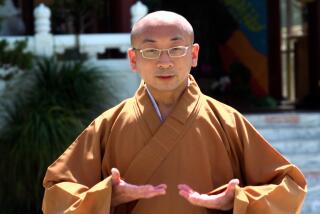L.A. to Host 1st Buddhist Convocation
The first broadly representative convocation of U.S. Buddhist leaders in America will be held in Los Angeles in November to create a national organization for the 2,500-year-old religion.
Overcoming decades of self-isolation in ethnic communities and in particular schools of teaching, leading Asian-born and Anglo-convert teachers say they expect that most of the leaders will participate.
The proposed American Buddhist Congress could enhance contacts among Buddhists, respond to misunderstanding or discrimination by non-Buddhists and address social and political problems from the standpoint of Buddhist values, according to a statement formulated last year.
Organizers claim that America now has the largest variety of Buddhist traditions in the world, each in substantial numbers. They estimate that several million Buddhists live in the United States, but authorities concede that most estimates are pure guesses.
Basic Teachings
The organizing call, signed by 12 Buddhist leaders last Aug. 24 at a Tibetan Buddhist enclave in Boulder, Colo., said that the various traditions agree on the basic teachings attributed to Sakyamuni Buddha, regardless of the diverse emphases and methods in the religion.
“The most important teachings of nonaggression, transcending fixation on self and practicing compassion and benevolence to all beings are paramount and shared by all Buddhists,” the statement said. This must be conveyed to a broader American public, the signatories said.
Named to co-chair the interim executive committee, now at 23 members, were the Venerable Havanpola Ratanasara of Los Angeles and the Rev. Karl G. Springer of Boulder, both men already recognized for their success in promoting pan-Buddhist activities.
Representative Council
Ratanasara is president of the 7-year-old Buddhist Sangha Council of Los Angeles, the most widely representative regional Buddhist council in the country. Springer has directed the North American part of a fund drive seeking to build visitors’ facilities at Lumbini, the traditional birthplace of the religion’s founder in Nepal.
Arrangements for the Los Angeles meeting were nearing completion this week, said Marcy Henry Fink, a Los Angeles representative of the Tibetan group based in Boulder.
She said about 150 Buddhists teachers and leaders are expected for a three-day, mid-week conference during the first or second week of November at an unspecified location.
Even as plans proceeded for the conference, death recently came to one of the mentors of the pan-Buddhist movement, the Venerable Chogyam Trungpa, who had the honorific title of Rinpoche. Trungpa, 47, died of a heart attack April 4 in Halifax, Nova Scotia, the new headquarters of the Tibetan group he led.
Plans Mapped Out
Trungpa had invited a group of fellow Buddhist teachers to his old headquarters in Boulder last summer to map out plans for the American Buddhist Congress.
Trungpa, who escaped from Tibet with other Buddhists in 1959 during the Chinese Communist takeover of the mountainous region, gave up his monastic vows while studying in England in 1968 and came to Colorado in 1970 to establish a meditation center. He later established Naropa Institute, a liberal arts college in Boulder, and started non-religious meditation centers in 36 cities.
In addition to Trungpa, Ratanasara and Springer, the signatories of the call for an American Buddhist Congress included Venerable Phra Thepsopon, the abbot of the Thai Buddhist Temple in North Hollywood; Venerable Thich Man Giac, head of the the Los Angeles-based Congregation of Vietnamese Buddhists in the United States; Venerable Jakusho Kwong, the roshi (master teacher) of Sonoma Mountain Zen Center, and two Anglo, American-born teachers in Los Angeles: Venerable Roshi Gesshin Prabhasa Dharma of the International Zen Institute of America and Venerable Karuna Dharma of the International Buddhist Meditation Center.
Wide Representation
Ratanasara, a native of Sri Lanka, said that the conference will have representatives of Chinese, Japanese, Tibetan, Korean, Vietnamese, Thai, Sri Lankan, Laotian and American Buddhists.
Bishop Seigen Yamaoka of San Francisco, the head of the Buddhist Churches of America, said through an aide this week that he did not know about the conference but that he was interested. Ratanasara said that invitations to some of the San Francisco-based leaders had been delayed, but that Yamaoka’s counterpart in Hawaii, a bishop of the same Jodo Shinshu branch of Japanese Buddhism, “has given his consent.”
However, Ratanasara said that because Japanese Buddhism has about 30 different sects, it will not be possible to have every group represented.
Ratanasara said that he and Springer hope to have a better idea of how many practicing Buddhists live in this country before the November conference, perhaps by visiting many of the major centers. “We have in our files already more than 1,000 addresses of Buddhist organizations,” he said.
More to Read
Sign up for Essential California
The most important California stories and recommendations in your inbox every morning.
You may occasionally receive promotional content from the Los Angeles Times.










